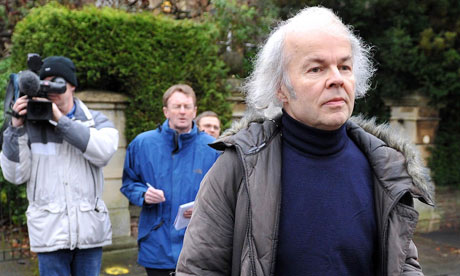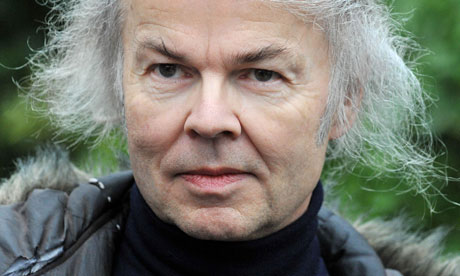
Chris Jefferies. Photograph: Tim Ireland/PA
Here is a salutary outcome from the Bristol murder case highlighted in my Perugia versus Bristol post of January 2011. Eight tabloid British newspapers have been swiftly and efficiently hit with substantial defamation damages after they attempted to convict Chris Jefferies on the basis he looks a bit odd. (And he wears an anorak. And he’s a teacher.) It is going to be very interesting to see how many Italian newspapers are hit with substantial damages for their reporting of the Sollecito-Knox satanic ritual murder trial after it turns out Sollecito and Knox aren’t satanists after all. Will Italians also realise that it is not necessary to have a criminal libel law in order to sort this kind of thing out, just a functioning judiciary?
The damages award as reported by Roy Greenslade in the Guardian on 29 July:
…
Eight national newspapers have made public apologies today to Christopher Jefferies for the libellous allegations made against him following the murder of Joanna Yeates,
The titles – The Sun, Daily Mirror, Sunday Mirror, Daily Record, Daily Mail, Daily Star, The Scotsman and Daily Express – have also agreed to pay him substantial libel damages, thought to total six figures.
The solicitor for Mr Jefferies, Louis Charalambous, told Mr Justice Tugendhat in the high court hearing that the newspapers had acknowledged the falsity of the allegations, which were published in more than 40 articles.
Ms Yeates, a Bristol architect, was killed in December last year. After her body was discovered, Mr Jefferies, who was her landlord, was arrested by police.
In subsequent days, into early January, the newspapers ran a series of articles about Mr Jefferies that were inaccurate and defamatory.
Charalambous, of Simons Muirhead and Burton, said after today’s hearing:
“Christopher Jefferies is the latest victim of the regular witch hunts and character assassination conducted by the worst elements of the British tabloid media.
Many of the stories published in these newspapers are designed to ‘monster’ the individual, in flagrant disregard for his reputation, privacy and rights to a fair trial.
These newspapers have now apologised to him and paid substantial damages.”
Bambos Tsiattalou, the solicitor who advised Mr Jefferies after he was taken into police custody, said that the media were given a fair warning to be careful about what they published.
He said: “We warned the media by letter, immediately following Mr Jefferies’ arrest, in the strongest possible terms to desist from publishing stories which were damaging or defamatory.
“We were dismayed that our warnings went unheeded and are pleased that the newspapers in settling Mr Jefferies’ claims have acknowledged the extent of the damage to his reputation.”
The papers’ publishers – News International, Trinity Mirror, Daily Mail & General Trust, Express Newspapers and Johnston Press – will now have to fork out substantial sums in damages and legal fees.
But Charalambous pointed out that once the rules over conditional fee (no win, no fee) agreements change next year, “the victims of tabloid witch hunts will no longer have the same access to justice.”
via Eight newspapers pay libel damages to Christopher Jefferies | Media | guardian.co.uk.
And there’s more:
Plus the two best-known UK tabloids have been found guilty of contempt of court (a charge that is filed against them too rarely). This is what italian papers should go down for, having leaked the Perugia investigation before it was complete, in brazen contravention of Italian law. Problem is that Italy doesn’t apply the law, most obviously because it is the police and the magistrates who do the leaking. Or did I misunderstand something?
Here is the Guardian again:

Christopher Jefferies was intially declared a suspect and arrested in Joanna Yeates murder case, but was released later without charge. There was intense media speculation about his life. Photograph: Tim Ireland/PA Wire/Press Association Images
…
The Sun and the
Daily Mirror were found guilty of contempt of court for publishing a series of “extreme” articles about a suspect who had been arrested by police investigating the murder of the landscape architect Joanna Yeates.
The Daily Mirror was fined £50,000 and the Sun £18,000 after the high court ruled that the papers posed a “substantial risk” to the course of justice in their reporting on the arrest of Christopher Jefferies, Yeates’s landlord, who was later released without charge and was entirely innocent of any involvement.
The Daily Mirror fine is the biggest against a British newspaper for contempt since 2004, when the Daily Star was fined £60,000 for revealing the identities of two Premiership footballers at the centre of high-profile gang rape allegations.
In a separate legal action eight national newspapers, including the Daily Mirror and Sun, collectively paid six-figure libel damages to Jefferies following allegations made about him in January, when the police hunt for Yeates’s killer was at its height.
In a written judgment on the contempt of court action handed down at the high court, the Lord Chief Justice, Lord Judge, Lord Justice Thomas and Mr Justice Owen described the Daily Mirror articles as “extreme” and “substantial risks to the course of justice”. The judges said the Sun’s coverage of Jefferies created a “very serious risk” that any future court defence would be damaged.
Lord Judge said: “The articles in the one issue of the Sun were written and laid out in such a way that they would have conveyed to the reader of the front page and the two inside pages over which the stories were spread that he was a stalker, with an obsession with death, who let himself into the flats of other occupants of the building where Miss Yeates lived, and that he had an unhealthy interest in blond young women.”
The court gave the Daily Mirror publisher Mirror Group Newspapers extended time in which to launch a petition for permission to appeal to the supreme court.
Vincent Tabak, a 33-year-old engineer, pleaded guilty to manslaughter but has denied murdering Yeates, who was found dead on a roadside verge in Failand, Somerset, on Christmas Day 2010. Tabak, who lived next door to Yeates, is due to go on trial accused of murder at Bristol crown court in October.
Tabloid media coverage at the time of Jefferies’s arrest was intense, with speculation about the suspect rife in newspapers and the internet. Dominic Grieve, the attorney general who brought the court action against the two papers, issued a rare warning to the press at the timeabout their reporting.
Two of the three articles found in contempt of court were published the day after Grieve’s warning, on New Year’s Day. The attorney general welcomed Friday’s judgment, saying: “[The Daily Mirror and Sun] breached the Contempt of Court Act and the court has found that there was a risk of serious prejudice to any future trial.”
Ken Clarke, the justice secretary, echoed the attorney general’s warnings in March when he said that media focus on suspects in recent criminal cases had been “startling” and “far removed” from what it was just a few years ago.
Contempt of court proceedings are infrequently issued against newspapers. It is more unusual still for the attorney general to take action in defence of an individual who has not been charged.
Eight national newspapers separately issued a public apology to Jefferies over libellous claims made about him in the aftermath of his December arrest. The Sun, Daily Mirror, Sunday Mirror, Daily Record, Daily Mail, Daily Star, the Scotsman and Daily Express agreed to pay the retired public-school teacher damages.
Lawyers acting for Jefferies said he had been the victim of “regular witch hunts” in more than 40 articles in the tabloid papers. Bambos Tsiattalou, the solicitor who advised Jefferies after he was taken into police custody, said that the newspapers had ignored warnings to be careful about what they published.
Email, Print, TwittyFace this post:
Like this:
Like Loading...


